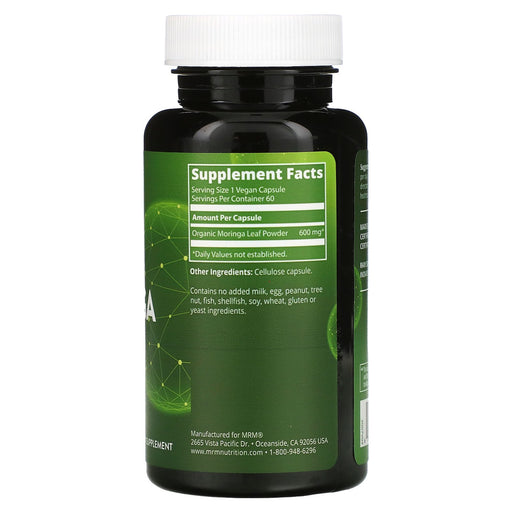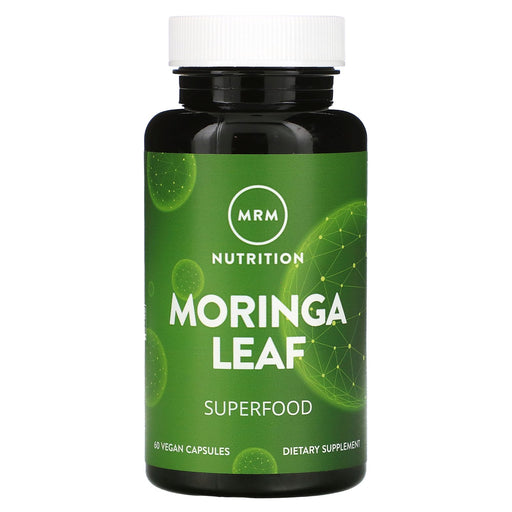
Moringa: The Nutrient-Dense Superfood for Optimal Health and Vitality
Moringa, a fast-growing tree native to the sub-Himalayan regions of India, Pakistan, and Nepal, has gained worldwide recognition as a nutrient-dense superfood with a wide range of potential health benefits. Often referred to as the "miracle tree" or "tree of life," moringa is packed with essential vitamins, minerals, antioxidants, and bioactive compounds that work together to support overall health and well-being. By incorporating moringa supplements into your wellness routine, you can harness the nourishing power of this remarkable plant, promoting optimal nutrition, vitality, and resilience.
The Nutritional Profile of Moringa
Moringa's impressive health benefits can be attributed to its unique nutritional composition, which includes a wide array of essential vitamins, minerals, and phytonutrients. Some of the key nutrients found in moringa include:
- Vitamin A: Moringa is an excellent source of beta-carotene, a precursor to vitamin A, which supports eye health, immune function, and cellular growth and development.
- Vitamin C: This potent antioxidant vitamin is abundant in moringa, supporting immune health, collagen synthesis, and overall cellular protection.
- B Vitamins: Moringa contains a range of B vitamins, including thiamin, riboflavin, niacin, and folate, which are essential for energy production, brain function, and cellular metabolism.
- Minerals: Moringa is rich in essential minerals, such as iron, calcium, potassium, and magnesium, which support various physiological functions, including blood health, bone strength, and cardiovascular function.
- Antioxidants: Moringa contains a variety of powerful antioxidants, such as flavonoids, polyphenols, and chlorogenic acid, which help to neutralize harmful free radicals and protect cells from oxidative stress and damage.
The Potential Health Benefits of Moringa Supplementation
The unique nutritional profile and bioactive compounds found in moringa have been linked to a wide range of potential health benefits, supporting various aspects of physical and mental well-being. Some of the key benefits of moringa supplementation include:
- Nutritional Support: Moringa's rich content of vitamins, minerals, and phytonutrients can help to fill nutritional gaps and support overall health and vitality, particularly in individuals with limited access to a varied, nutrient-dense diet.
- Antioxidant Protection: The potent antioxidants in moringa can help to protect cells from oxidative stress and damage, reducing inflammation and supporting overall cellular health and longevity.
- Immune Function: The vitamins, minerals, and bioactive compounds in moringa, such as vitamin C and quercetin, may help to support immune function and bolster the body's natural defenses against pathogens and disease.
- Energy and Vitality: The B vitamins and other energy-supporting nutrients in moringa can help to promote natural energy production, reduce fatigue, and support overall vitality and well-being.
- Digestive Health: Some studies suggest that moringa may help to support digestive health by promoting regular bowel movements, reducing inflammation in the gut, and supporting the growth of beneficial gut bacteria.
Choosing the Right Moringa Supplement
When selecting a moringa supplement, it's essential to choose a high-quality product from a reputable brand that ensures purity, potency, and safety. Some key factors to consider include:
- Source and Quality: Look for moringa supplements that are derived from high-quality, organic moringa leaves and are free from contaminants, fillers, and artificial additives.
- Potency and Dosage: Choose supplements that provide a standardized extract of moringa, typically containing a concentrated dose of key nutrients and bioactive compounds, and follow the recommended dosage instructions for optimal results.
- Manufacturing Standards: Opt for supplements that are manufactured in GMP-certified facilities, ensuring strict adherence to quality control standards and best practices.
- Brand Reputation: Select moringa supplements from trusted brands with a proven track record of producing high-quality, science-backed products that prioritize safety and efficacy.
As with any new supplement regimen, it's always best to consult with a healthcare professional before starting moringa supplementation, especially if you have a pre-existing health condition, are pregnant or nursing, or are taking medications.
Related Vitamins and Supplements
While moringa is a nutrient-dense superfood on its own, certain vitamins and supplements can complement its benefits and further support overall health and well-being. Some relevant options to consider alongside moringa include:
- Omega-3 Fatty Acids: These anti-inflammatory fats support brain health, cardiovascular function, and overall cellular health, making them an excellent companion to moringa for comprehensive nutrition and well-being.
- Probiotics: These beneficial bacteria support digestive health, immune function, and nutrient absorption, working synergistically with the gut-supportive properties of moringa.
- Turmeric or Curcumin: These potent anti-inflammatory and antioxidant compounds can provide additional cellular protection and support overall health and vitality, complementing the antioxidant benefits of moringa.
- Adaptogenic Herbs: Herbs like ashwagandha, rhodiola, and holy basil can help to support the body's natural stress response, promote energy and vitality, and enhance overall resilience, making them valuable companions to moringa for holistic well-being.
Experience the Nourishing Power of Moringa
At Health Orchard, we are dedicated to providing our customers with the highest quality moringa supplements to support optimal nutrition, vitality, and overall well-being. Our carefully curated selection features moringa products from trusted brands, formulated with pure, potent ingredients for maximum efficacy and safety.
Whether you're looking to fill nutritional gaps, bolster your body's natural defenses, support digestive health, or simply enhance your overall sense of well-being, our moringa supplement collection has the perfect product to meet your unique needs and goals.
Witness the nourishing potential of moringa and experience the difference this remarkable superfood can make in your journey towards optimal health and vitality. Browse our selection today and take the first step towards harnessing the power of this nutrient-dense plant for your overall nutrition and well-being.
Frequently Asked Questions about Moringa
1. What are the health benefits of Moringa supplements?
Moringa supplements, derived from the leaves of the Moringa oleifera tree, offer numerous potential health benefits. These include:
- High nutritional value, with an abundance of vitamins, minerals, and antioxidants
- Anti-inflammatory properties that may help reduce inflammation throughout the body
- Blood sugar regulation, which may be beneficial for people with diabetes or prediabetes
- Cholesterol-lowering effects, promoting heart health
- Improved digestive health, thanks to its high fiber content
- Boosted immune function, due to its rich content of antioxidants and nutrients
2. Is it good to take Moringa capsules every day?
Taking moringa capsules every day is generally considered safe for most people when consumed in recommended doses. Regular consumption of moringa supplements may provide a range of potential health benefits, such as improved nutrition, reduced inflammation, and better blood sugar control.
3. What are moringa tablets used for?
Moringa tablets are used as a dietary supplement to support overall health and well-being. They are often taken for their high nutritional value, as moringa leaves are rich in vitamins, minerals, antioxidants, and amino acids. Some specific uses of moringa tablets include:
- Enhancing nutritional intake, particularly in areas where access to diverse, nutrient-dense foods may be limited
- Supporting immune function, thanks to its high content of antioxidants and nutrients like vitamin C and zinc
- Promoting digestive health, due to its high fiber content and potential anti-inflammatory properties
- Regulating blood sugar levels, which may be beneficial for people with diabetes or prediabetes
- Supporting heart health, by helping to lower cholesterol levels and reduce inflammation
4. Who should not take moringa?
While moringa is generally considered safe for most people, there are certain individuals who should exercise caution or avoid taking moringa supplements. These include:
- Pregnant women, as moringa may contain compounds that could stimulate uterine contractions
- Individuals taking medications that may interact with moringa, such as blood thinners, diabetes medications, or thyroid hormones
- People with known allergies to plants in the Brassicaceae family, such as cabbage, broccoli, and cauliflower, as they may be more likely to have an allergic reaction to moringa
- Individuals with autoimmune disorders, as moringa's immune-stimulating properties may exacerbate symptoms
- Children, unless under the guidance of a healthcare professional
5. Is moringa harmful to kidneys?
There is limited research on the direct effects of moringa on kidney function. However, some studies suggest that moringa may have potential benefits for kidney health. For example, moringa's anti-inflammatory and antioxidant properties may help protect the kidneys from damage caused by oxidative stress and inflammation. Additionally, moringa's potential to lower blood sugar levels may be beneficial for people with diabetes, who are at a higher risk of developing kidney problems.
6. Is moringa safe for kidneys?
Moringa is generally considered safe for kidney health when consumed in recommended amounts. In fact, some studies suggest that moringa may have potential benefits for kidney function, thanks to its anti-inflammatory, antioxidant, and blood sugar-regulating properties. However, it is essential to exercise caution when taking moringa supplements, particularly in high doses or for extended periods, as excessive intake of certain nutrients found in moringa, such as iron, may potentially strain the kidneys.
7. What to avoid when taking moringa?
When taking moringa supplements, there are certain things to avoid to minimize the risk of potential interactions or adverse effects:
- Avoid taking moringa with medications that may interact with it, such as blood thinners, diabetes medications, or thyroid hormones, unless under the guidance of a healthcare professional
- Avoid consuming moringa in excessive amounts, as this may lead to high levels of certain nutrients that could potentially cause side effects or strain the body's systems
- Avoid taking moringa if you are pregnant, as it may contain compounds that could stimulate uterine contractions
- Avoid moringa if you have known allergies to plants in the Brassicaceae family, such as cabbage, broccoli, and cauliflower, as you may be more likely to have an allergic reaction
- Avoid taking moringa if you have an autoimmune disorder, as its immune-stimulating properties may exacerbate symptoms










